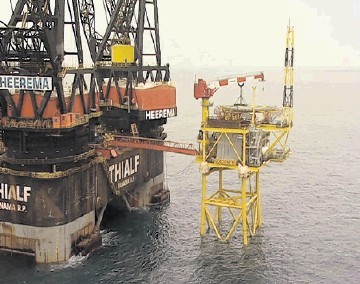
The oil price crash is expected to usher in a “decommissioning glut” in the North Sea, new research has revealed.
Delegates at Offshore Europe this week heard that there has been little evidence so far of early decommissioning of North Sea fields rendered uneconomic by the falling price of a barrel of oil.
But research firm Wood Mackenzie has estimated that there will be 50 fields facing early shutdown and dismantling due to low oil prices over the next five years. This is above and beyond the estimated 139 fields what have been scheduled for dismantling as they reach the end of their natural lives.
“Without continued investment in the UK, especially in mature fields with ageing facilities, the decommissioning glut is looming,” researchers at Woodmac said.
But the trade body for the oil and gas sector insisted that efforts are being made to monitor operator activities and ensure that decommissioning continues to be delayed as long as possible.
Oonagh Werngren, Oil & Gas UK’s operations director, said:“The Wood Report stated that the decommissioning strategy should achieve the maximum economic extension of field life.
“Industry agrees that retaining infrastructure and delaying decommissioning are essential to prolonging production from existing fields and promoting future new developments.
“Today, decommissioning makes up a small portion of total expenditure but is likely to rise from £1billion in 2014 to over £2billion in 2018.
“While Oil & Gas UK is interested in Wood Mackenzie’s forecast, it is also conducting its own survey of operators as part of its annual decommissioning insight which will provide additional information on the market. This data will be discussed at our annual decommissioning conference in November.”
But the decommissioning sector is also one of the biggest opportunities for the North Sea.
“The next wave of work in the UKCS is anticipated to be from decommissioning projects,” said Fiona Legate, UK upstream analysts for Wood Mac said. “This is why the UK supply chain will need to shift to decommissioning to make money.”
Woodmac said that while £2.8billion has been spent on decommissioning so far, a further £54.2billion will be spent until 2060.
Meanwhile, there are only 38 field development projects that are planned to come on stream to replace those that are shut down.
Only three were sanctioned this year, including Maersk’s £3billion Culzean gas project. In the next five years, 17 of these could get started although there was a risk than many of these could face further delay or cancellation if the oil price remains at current low levels, Wood Mac said.
For operators that are looking to sell assets, Wood Mac has also estimated that sellers who retain the decommissioning liability of the fields could enjoy a 55% increase on the value of the assets they sell.
Likewise, the firm also said that operators who work with other asset owners nearby to deccommsion areas in “batches” could save up to 22% of the cost of decommissioning, underlining the value of collaboration that has been one of the main bywords of the Offshore Europe event this year.
“Batch decommissioning could provide economies of scale benefits to operators. We estimate this could save an average of 22% compared to an individual decommissioning programme,” Wood Mac said.
Recommended for you

